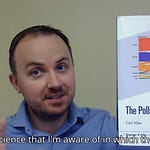If you like science, statistics, and/or political data, this video will probably be the most important (and infuriating) thing that you watch.
A few quotes to substantiate my claim from the video that experts LITERALLY don’t understand how polls work:
The Marquette Poll "predicted that the Democratic candidate for governor in 2018, Tony Evers, would win the election by a one-point margin." -G Elliott Morris
"Up through the final stretch of the election, nearly all pollsters declared Hillary Clinton the overwhelming favorite" - Gelman et al
The poll averages had "a whopping 8-point miss in 1980 when Ronald Reagan beat Jimmy Carter by far more than the polls predicted" - Nate Silver
"The predicted margin of victory in polls was 9 points different than the official margin" - A panel of experts in a report published for the American Association of Public Opinion Research (AAPOR)
"The vast majority of primary polls predicted the right winner" - AAPOR (it's about a 100 page report, there are a couple dozen egregious analytical mistakes like this, I'll stop at two here)
All (polls) predicted a win by the Labour party" - Statistical Society of Australia
"The opinion polls in the weeks and months leading up to the 2015 General Election substantially underestimated the lead of the Conservatives over Labour" - British Polling Council
And their definitions of poll error:
"Our preferred way to evaluate poll accuracy is simply to compare the margin in the poll against the actual result." - Nate Silver
"The first error measure is absolute error on the projected vote margin (or “absolute error”), which is computed as the absolute value of the margin (%Clinton-%Trump)" -AAPOR
** ^ These experts literally call the "margin" given by the poll (say, Clinton 46%, Trump 42%), the "projected vote margin! **











